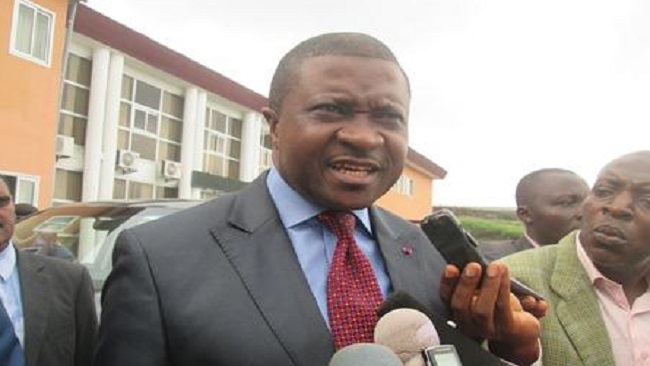Consortium says Francophone Secondary Education Minister is making a mockery of Southern Cameroonians
The Minister of Secondary Education, Jean Ernest Ngalle Messina Bibehe has said that teachers and students in Cameroon should make bilingualism a reality both in and out of the school milieu. The Francophone Secondary Education Minister made the remark during a ceremony dedicated to the 12th National Bilingualism Week on Monday the 30th of January 2017 in Nkomo in the Centre Region. During the ceremony at the College Marie Albert of Nkomo, Minister Jean Ernest Ngalle Bibehe called on the educational community to use bilingualism as a means of promoting academic excellence. Students of the school presented poems, sketches songs and traditional dances in both English and French to serve as an example to other schools. After the launch, the Minister of Secondary Education visited some schools in the Yaounde IV Council. The present edition of the National Bilingualism Week is being celebrated under the theme, “Bilingualism: A driving force for promoting excellence and social inclusion.” The different activities will lead to the National Bilingualism Day that comes up on Friday, 3rd February 2017.
The Cameroon Anglophone Civil Society Consortium has dismissed the new CPDM concept of National Bilingualism Week. The Interim leaders say it is too little too late as schools will remained closed in Southern Cameroons until all Anglophone demands are met. The Consortium leaders have announced a diplomatic push within the African Union and the United Nations. A senior Southern Cameroon elite in the United Kingdom who spoke to us at the time of filing this report, noted that the Secondary Education Minister and other Francophone cabinet ministers were making a mockery of Southern Cameroonians. “The Anglophone problem is not about bilingualism and social inclusion” He observed.
Consider this: over 55 years after independence and re-unification, there has never been an Anglophone President or an Anglophone Secretary General or Director of Civil Cabinet at the Presidency. Nor has an Anglophone ever held the strategic ministerial portfolio of Defense, Finance, Territorial Administration, Communication, External Relations, National Education or even in charge of the Police, Gendarmerie, the Army and Intelligence services; not even ambassadors to English-speaking countries like the USA and Nigeria. For a region that represents about 20% of the population, accounting for over 60% of GDP, the fact that the lone oil refinery named in French (SONARA) is in Anglophone Cameroon, yet has been run by Francophone general managers with a predominantly Francophone workforce since its creation is unacceptable. It just cannot be that there are no competent Anglophones to occupy these positions.
As if that was not enough, higher institutions like the National Polytechnic, ENAM, IRIC, ESSTIC, INJS, IFORD, CUSS, Public Works, ENSPT, IRAD, are heavily laden with French courses; another way of saying, Anglophones need not apply. Although Cameroon is officially a bilingual country where both English and French are equal, when has the president ever made an official address to the nation in English? All official correspondences are in French, even when directed to Anglophones. French is the language used in the administration, police, gendarmerie, army and the courts. Anglophones have to seek translators at their own expense. All road signs are in French and there is not a single word in English on the FCFA currency in circulation; is this constitutional?
The facts and figures of Anglophone marginalization under President Biya are staggering. Of the 700 ministers appointed since Biya took office in 1982, only 76 (10.8%) have been Anglophones. In the current 63-member cabinet, there are only six Anglophones (9%) and only, Philip Ngole Ngwese (2%) out of the 38 Ministers has a cabinet portfolio. There are four Anglophone Secretary Generals (10%) and three Anglophone DAGs (7%) in the central administration. In state corporations, there are less than 15 Anglophones (11%) out of over 130 general managers. Of the over 130 Board chairmen of state corporations, there are only 10 Anglophones (7%). Of the 58 SDOs in the country, there six Anglophones (10%) and only three of the nation’s 33 generals in the Armed Forces are Anglophones.
The picture in the judiciary is even more pathetic and scandalous with Francophones occupying all key positions in the Supreme Court – President of the Supreme Court; Attorney General; Head of Judicial Division; Head of Administrative Division; Head of audit Division; Head of Special Criminal Court; Special Attorney Special Criminal Court; Director of Military Justice; Registrar-In-Chief Supreme Court and Secretary General Supreme Court. 58 (39%) of the 148 magistrates in the Southwest are Francophones while 54 (61%) of the 89 magistrates in the legal department in the Southwest are Francophones. Of the 50 magistrates working in Buea (Bench & Legal Department), 20 (40%) are Francophones while 20 (71%) of the 28 magistrates in the legal department in Buea are Francophones. Of the 30 new bailiffs that were appointed in January 2014 in the Southwest, 28 of them (93%) are Francophones.
By Rita Akana with contributing files from Ekinneh Agbaw-Ebai





